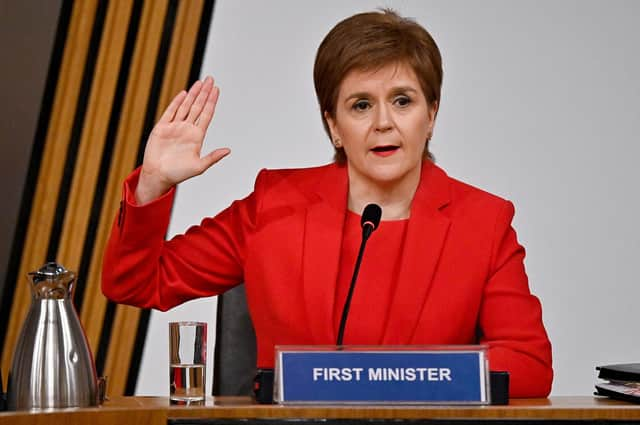Alex Salmond inquiry: Nicola Sturgeon came nowhere near to answering these three key questions – Brian Wilson


Not once, not twice but three times, she insisted on the right to “continue to steer the country through a global pandemic” without distractions introduced by lesser mortals. We will hear a lot more of that.
Personally, I have no desire to be steered by any political helmsperson, preferring to place faith in our great doctors and scientists. The numbers do not lie and the role of politicians should be to apologise and explain, rather than assert indispensability.
Advertisement
Hide AdAdvertisement
Hide AdMs Sturgeon’s particular objection was to answering outstanding questions following her stint at the Holyrood committee, while she had important work to do saving the nation from further calamity. With one leap, she should be free.
Alternatively, I cannot improve on Professor James Mitchell’s description of her performance as “a masterclass in obfuscation and deflection”. Eight hours is not long when most of them are taken up with her own voice responding to the three most servile muppets in the SNP’s ranks, not to mention Margaret Mitchell.
I wrote last week that Mr Salmond’s command of detail put his successor under pressure. That was hopelessly naïve. In this respect, Ms Sturgeon added little except denial or forgetfulness. Her calculation remains that too few are interested in detail to inconvenience her. She might be right.
Rather, her broadbrush strategy was to re-run the trial of Alex Salmond this time in the court of public opinion which operates to considerably lower standards of proof than the High Court of Justiciary, unburdened by a jury which hears witnesses and forms a view.
The committee was not set up to re-try Mr Salmond but to find how Ms Sturgeon’s government squandered £1 million on a case it it could not win – “defending the indefensible”, as Roddy Dunlop QC put it. On that matter of public interest, Ms Sturgeon contributed zero enlightenment.
Motivation is a separate question from defensibility of actions. Mr Salmond clearly believes the two were intertwined. Ms Sturgeon attacked that contention with gusto. It is a bitter dispute between them and almost nothing to do with the committee’s work.
There are three key questions which Ms Sturgeon came nowhere near answering. First, why was the individual appointed to inquire into complaints from two civil servants so disqualified that the Scottish government was found by Scotland’s highest court to have acted in a way that was “unfair, unlawful and tainted with apparent bias”. Absolutely no answer to that.
Second, did Ms Sturgeon mislead the Scottish Parliament regarding her knowledge of events? Well, of course she did. There have now been three versions of the “March 29th” meeting – first it didn’t exist; then it became a “fleeting encounter”. Now, in its third iteration, this fleeting, forgotten meeting revealed – by her own account – the nature of allegations against her mentor and friend, as well as his distressed condition. Fleeting? Forgotten? Inadvertent? Space does not permit a recap on why it matters and much else flows from it.
Advertisement
Hide AdAdvertisement
Hide AdThe third and most serious question is why so much evidence has been withheld from the committee for so long. It is the most important because it reflects the corruption of institutions as well as the manoeuvring of individuals.
John Swinney was forced by threat of losing his job to release some legal opinion, previously suppressed. Not the slightest damage has been done as a result, other than to the reputation of Mr Swinney and his colleagues. Even now, there is much that has not been handed over. Honest John, no more.
Does any of this matter to the court of public opinion? Who knows? Before we get to that, there will be reports from two parallel inquiries and these outcomes should be respected.
Then, as Ms Sturgeon marches towards the arms of her people, I am reminded less of Joan of Arc than of the French philosopher Emile Chartier’s bon mot: “Nothing is more dangerous than an idea when it's the only one you have.”
A message from the Editor:
Thank you for reading this article. We're more reliant on your support than ever as the shift in consumer habits brought about by coronavirus impacts our advertisers.
If you haven't already, please consider supporting our trusted, fact-checked journalism by taking out a digital subscription.
Comments
Want to join the conversation? Please or to comment on this article.